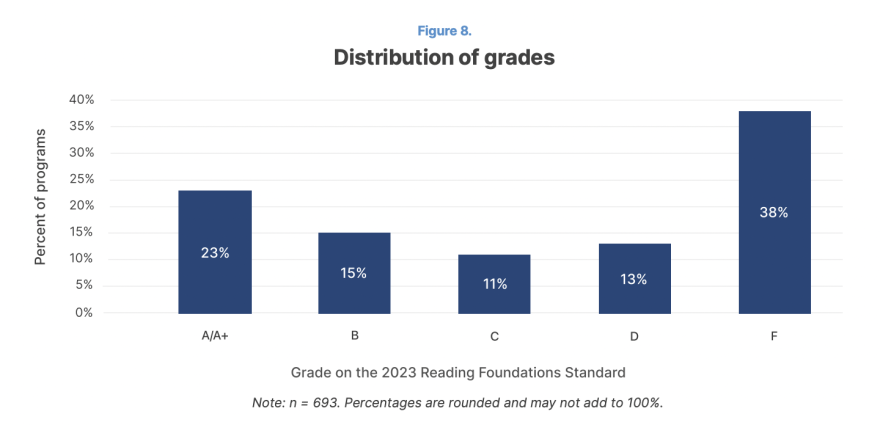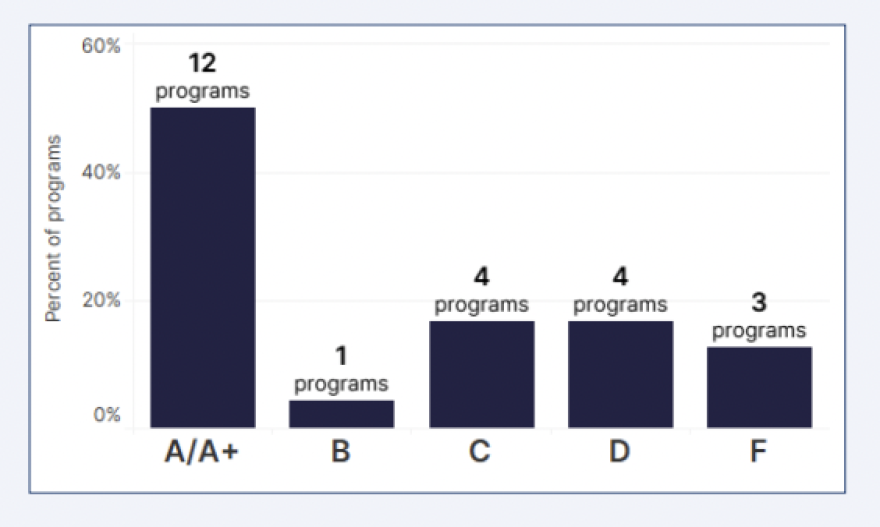As schools across America struggle to help kids learn to read, a research group released a report Tuesday highlighting what they say may be an overlooked factor: Many universities are not doing enough to prepare new teachers for effective reading instruction.
But the report from the National Council on Teacher Quality says North Carolina universities do better than most, with five programs rated as models for the rest of the country.
“Despite the challenges that exist in this current landscape, there are programs across the US that serve as great examples from which the rest of us can learn,” council President Heather Peske said.
The council, a nonpartisan group based in Washington, D.C., has been examining teacher preparation programs for almost 20 years. The latest report, on elementary reading instruction, comes at a time of increased public discussion about how children learn to read.
North Carolina, like many other states, has struggled for years with low reading proficiency, especially among children of color and those with challenges such as poverty, disabilities and limited English proficiency. In North Carolina, less than one-third of all fourth-graders were rated proficient in reading on the latest “nation’s report card” exams. The proficiency rate was 21% for North Carolina’s Hispanic students, 17% for Black and economically disadvantaged ones and below 10% for English learners and students with disabilities.
“This dismal data has nothing to do with the students and families and everything to do with inequities in access to effective literacy instruction,” the report says.
During the pandemic, many students saw setbacks, while remote learning gave parents a look at how reading was being taught. Meanwhile, Peske notes, American Public Media reporter Emily Hanford drew attention to the gap between what’s taught in many classrooms and what research shows about how children learn to read.
Strategies should include teacher prep
The result has been intense scrutiny and public debate. North Carolina has responded with efforts to bring all elementary teachers up to speed on the most effective tactics, identify weak readers by the end of third grade, and provide summer reading camps and other programs to help them catch up.

The council, which is funded by private philanthropy such as the Charlotte-based Belk Foundation, says teacher preparation needs to be part of each state’s strategy as well. The council evaluated 693 teacher preparation programs on how much instruction and practice they provide on five skills that are often dubbed “the science of reading.” Those are helping children understand the sounds that make up words and the letters that represent those sounds, then building their reading fluency, comprehension and vocabulary.
In addition, the council looked at whether those programs were teaching “ineffective and debunked” reading strategies, such as doing timed readings and counting the errors or teaching children to figure out words by looking at pictures, rather than sounding out words.
Finally, the council measured whether programs specifically offer tactics to help students with learning disabilities, those who don’t speak English at home and those who speak versions of English that don’t match formal academic language, such as Cajun, African American or Appalachian dialects.
“It is necessary to prepare teachers to support students who speak English language varieties through culturally and linguistically responsive instruction, including respecting and recognizing the diversity of language that students bring to the classroom,” the report says. It says teachers should be trained to help with “code-switching” so students can understand the rules of their own spoken language while being able to pass reading tests based on formal usage.

The council combined all of those measures and turned the results into letter grades. The largest group, 38%, earned an F.
“Far too many programs still don’t devote adequate attention to reading, and many are still teaching instructional practices that are counter to the research,” Peske said.
North Carolina looks better
In North Carolina, though, only 3 of 24 programs, or 12.5%, were rated as failing. Half of them got an A, more than double the national rate of 23%.
The council highlighted 48 “exemplary” programs, including five in North Carolina. Those were at UNC Chapel Hill, UNC Asheville, East Carolina, Western Carolina and Lenoir-Rhyne. The report highlights Lenoir-Rhyne, a private university in Hickory, for having a full course dedicated to “science of reading” skills, with plenty of chances to practice those strategies.
The other North Carolina programs that got A ratings were located at Appalachian State, Elon, High Point, Lees-McRae, NC A&T, UNC Charlotte and UNC Greensboro.

The F’s went to Elizabeth City State’s undergraduate program and the graduate programs at NC State and UNC Wilmington. Graduate programs fared worse across the country than undergraduate programs.
Bleaker picture in South Carolina
In South Carolina, the only program to earn an A was at Winthrop University in Rock Hill. The report highlighted Winthrop for requiring students to create a lesson to support English learners, using research-based strategies.
Seven of the 13 South Carolina programs reviewed got failing grades: College of Charleston’s undergrad and graduate programs and undergraduate programs at Columbia, Converse, Francis Marion, USC Aiken and USC Columbia.
The science of reading is controversial, partly because it’s often oversimplified for political or marketing purposes. Paul Thomas, an education professor at South Carolina’s Furman University, is a vocal critic. He doesn’t dispute that decades of research provide lessons on the way students learn to read, but says the research doesn’t easily translate into state policies or marketable products — or even one unified academic theory.
“A lot of what’s driving ‘the science of reading’ are people who’re looking to make money,” Thomas told WFAE in 2021.
Furman was among 378 colleges and universities that were not included in the report because Furman declined to make material available for review.
Download the National Council on Teacher Quality "Strengthening Elementary Reading Instruction" here. Get state reports here.


